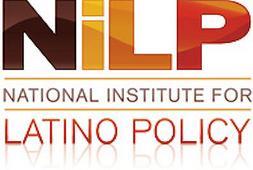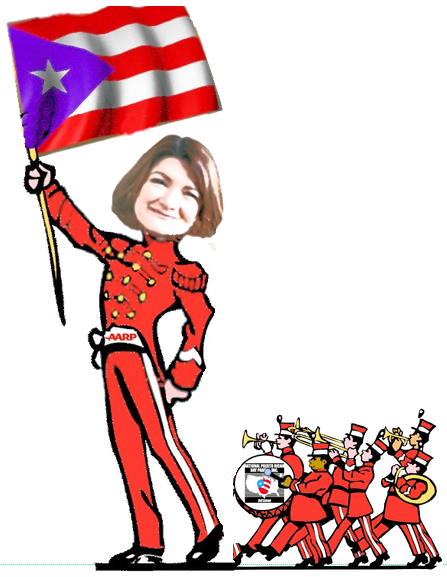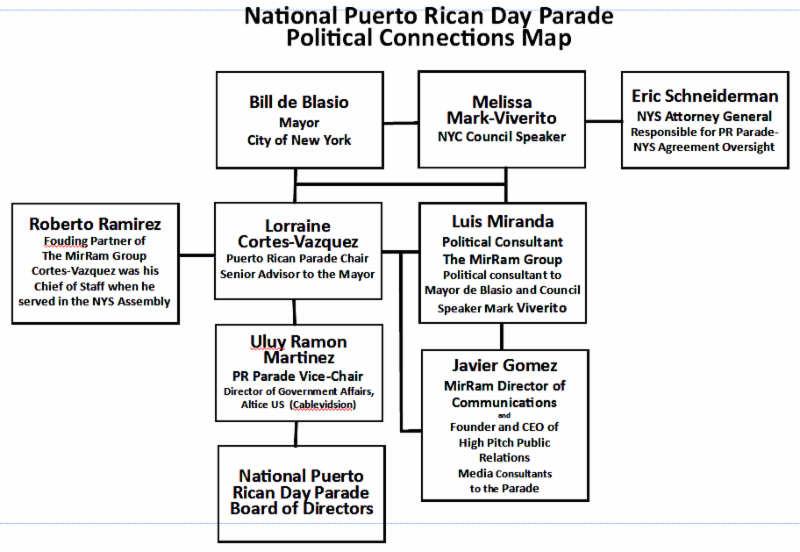
NiLP Commentary
The Incredible Shrinking Parade
By Angelo Falcón
The NiLP Report
 The National Puerto Rican Day Parade is about to take place, so it seems
appropriate to try to take all of the last few weeks' developments
in the controversy surrounding it and attempt to make some sense of them.
Here I try as best I can to sum up what happened and why, but I must warn
you that you are going to think that I made most of it up! My explanation
--- such is the nature of the politics of Puerto Ricans, a colonized people.
The National Puerto Rican Day Parade is about to take place, so it seems
appropriate to try to take all of the last few weeks' developments
in the controversy surrounding it and attempt to make some sense of them.
Here I try as best I can to sum up what happened and why, but I must warn
you that you are going to think that I made most of it up! My explanation
--- such is the nature of the politics of Puerto Ricans, a colonized people.
Here goes: As the number of corporations dropping their sponsorships of the National Puerto Rican Day Parade grows and grows, the Parade will, by definition, shrink and shrink, and can easily disappear. Its Board Chair, Lorraine Cortes-Vazquez, some say, can now play the lead in a movie that could be titled, "Honey, I Shrunk the Parada!"
While the focus of Puerto Rican activists in New York now is the defense of the Puerto Rican Parade for the attacks on it for honoring independentista militant Oscar Lopez Rivera as a "National Freedom Hero," it is also important to address the underlying problem of the politicization of the Parade. This is an issue that was forcefully raised by the late civil rights attorney, Ramon Jimenez, and Boricuas for a Positive Image. With the support of Melissa Mark Viverito (who at the time was only one of 51 Councilmembers, represented El Barrio and was not yet Speaker) and some other Puerto Rican elected officials, Jimenez was instrumental in getting NYS Attorney General Eric Schneiderman to investigate the corruption at the Parade that led, among other things, to the replacement of its Board with new members screened by the Attorney General in 2014. (Click here for a list of current Board members)
However, in this process of reconstituting the Parade Board, it became increasingly evident that Mark Viverito used her influential position as Council Speaker that she now holds to inappropriately play a direct role in this process and in subsequent Parade Board deliberations. The selection of Lorraine Cortes-Vazquez as its Chair further politicized the process, given her long term ties with her mentor, former Assmeblyman Roberto Ramirez, a founding partner in the political consulting firm of Luis Miranda, The MirRam Group. Miranda, in turn, has been a political consultant to Mark Viverito. This political compromising of the Parade was further advanced by the February announcement by NYC Mayor de Blasio that he was appointing Cortes-Vazquez as his Senior Advisor for Hispanic Outreach (she was already his appointee to the CUNY Board of Trustees), just in time for his reelection campaign this year. A mapping of these relations looks something like this:

Cortes-Vazquez' current leadership role during this controversial period? According to a report in the May 17th New York Times: "Spokesmen for City Hall and the parade organization refused to make Ms. Cortés-Vázquez available for an interview." Since the Oscar controversy broke out, Cortes-Vazquez, despite being the Parade Chair, she has been nowhere to be found, according to jounralists who have been trying to reach her, a product, no doubt, of the conflicts of interest she is drowning in. How can the head of the Parade go AWOL during such a crisis? Should this be grounds in and of itself for calling for her resignation from the Parade Board? In terms of her job with the Mayor, is this her idea of effective Hispanic outreach?
In her absence, Cortes-Vazquez' vice chair, Ululy Rafael Martinez, who is Director of Government Affairs for Altice USA (Cablevision), has had to step in and his appearances in the media have focused more on his defense of Cortes-Vazquez than of the Parade. Another informal "spokeman" for the Parade to emerge lately is Luis Miranda, who has assumed the position that Oscarl Lopez Rivera is defintely a hero and not a terrorist. The question with Miranda playig this informal role makes one wonder if he is speaking on behald of Mark-Viversito (who he advises), Mayor de Blasio (for whom he is a paid political consultant) or Cortes-Vazquez (who is a paid employee of the Mayor)? I thought that political consultants were supposed to be working in the background.
By all accounts, except Mark Viverito's, this politicizing of the Parade continued with her role in promoting the Parade Board's adoption of the title of "National Freedom Hero" for Oscar Lopez Rivera. Mark Viverito's motives for doing this were, I am sure, entirely pure given her long term and deeply-felt support for the freedom of Lopez Rivera. I am also sure she knew there would be some blowback on that decision from the usual suspects, as she has gotten in the past. But I guess she thought that she and the Parade could easily weather it as she already has over time. However, she never counted on the strong, cold wind coming from Puerto Rico that would dump political cold water on this long sought after and important gesture. It also doesn't help that she is term-limited in office and is thus a lame-duck official with increasingly limited political clout in a mayoral election year.
The Oscar Lopez Rivera issue represented the further politicization of the Parade from another source: the statehood movement in Puerto Rico. To add to the madness of the politics involved with the Parade, a highly controversial plebiscite on the political status of Puerto Rico has been scheduled on, of all days, June 11th, the same day as the Puerto Rican Parade is to march down Manhattan's Fifth Avenue! The government and party of Governor Ricardo Roselló are making a strong push for statehood and it appears that elements of it launched a social media campaign attacking indepedentista targets (that include Mark-Viverito and Carmen Yulin, the Mayor of San Juan who both oppose statehood) by focusing on the Parade's honoring Lopez Rivera who they describe as a "terrorist." This resulted in pressure on Goya Foods in Puerto Rico to drop their sponsorship of the Parade, followed by JetBlue, the New York Yankees, AT&T, Coca-Cola, the New York Daily News, Telemundo, Univision. Coronam, NBC and who knows who else (I can't keep up!).
These two influences on the Parade possibly create the greatest challenge to this institution in its 60 years of operation. The Parade has been investigated before and has been involved in numerous other controversies over the years, but nothing on the scale of the current crisis. Some think that it will survive these problems and will carry on anew next year, but I am not sure. A case in point: Will the corporate sponsors that dropped out this year return? That is not at all clear if history is any guide.
As its corporate sponsorships evaporate, so does their budget to pay for the many Parade expenses and its related events, like their annual gala. The disappearance of all these sponsorships also mean the sharp drop in advertising revenue that is the basis of WABC's television coverage of the Parade --- will that also be compromised? This shrinkage of the Parade is having additional collateral damage --- hotel, restaurant, concert and other businesses whose income is based on those thousands who come into town for the Parade are all starting to report losses. What will happen next? Will the Archdiocese of New York (and, therefore, God) cancel on them as well and skip the traditional ceremony at St. Patrick's the Friday before?
To further impact on the size of the Parade, the fact that there is this potentially consequential and financially wasteful status plebiscite occurring on the same day in Puerto Rico will no doubt impact negatively on the usual presence of Island political leaders attending the Parade, something that the Island's massive debt crisis has already accomplished. The Parade always honors a town from the Island and features some hometown contingents, but these may be in as short supply as the Parade's corporate funding.
While the Parade Board is scrambling to figure out what to do next and to raise last-minute funds to cover expenses, those on the left are celebrating the Parade's loss of corporate funding. They hope that this will turn the Parade into something more rooted in the Puerto Rican community with a more cultural orientation and no or little commercial influences. Some excitedly see it becoming a Parade mostly of supporters of Oscar Lopez Rivera. However, the Puerto Rican left is not the Parade Board, so it is not clear how this corporate defunding can be turned into a good thing. So far, there hasn't emerged a workable plan for proceeding with the original vision for an event (and related events) of this large a scale without the resources they initially counted on. What will a parade much reduced in size and without all of the corporate glitter and entertainment look like on as large a stage as Manhattan's Fifth Avenue?
One option that is getting more and more attention is the calling on the NYS Attorney General, Eric Schneiderman, to intervene and reorganize the Parade once again! The current crisis the Parade is in, many argue, is the result of gross mismanagement and partisan politics. These should be the basis for the AG to remove the current Parade leadership and replace it with less political and more community-grounded types. But there are also doubts that this would occur because of the AG's political ties to those involved in compromising this important community institution.
So in the short time left before the Puerto Rican Day Parade hits the streets, the drama will continue as the uncertainty of the situation keeps growing. The Puerto Rican left is happy because of the recognition Oscar Lopez Rivera is getting. The statehooders are happy because they scored points by forcing the corporate withdrawal of support from the Parade. Meanwhile, the Parade itself is in tatters, ripped apart by political elements of the very community that it has for so many years inspired.
In the end, the year 2017 may be remembered in the Puerto Rican community as the year of Lorraine Cortes-Vazquez and Her Incredible Shrinking (or maybe even Vanishing) Parade. Will this be yet another major Puerto Rican institution in New York marching straight into the Intensive Care Unit (or Hospice) of history?
Angelo Falcón is President of the National Institute for Latino Policy (NiLP). He can be reached at afalcon@latinopolicy.org.
_______________________________________________________________________________________________________
The NiLP Report on Latino Policy & Politics is an online information service provided by the National Institute for Latino Policy. For further information, visit www.latinopolicy. org. Send comments to editor@latinopolicy.org.